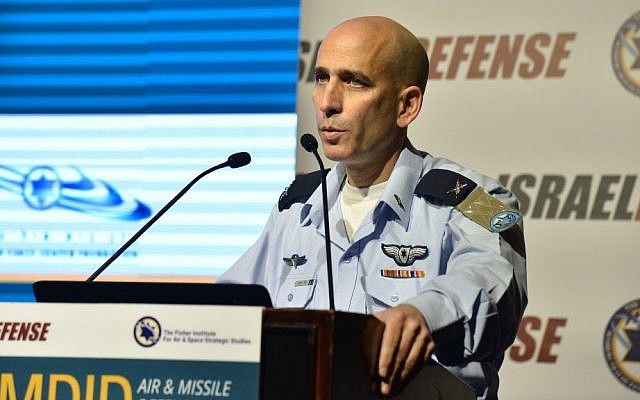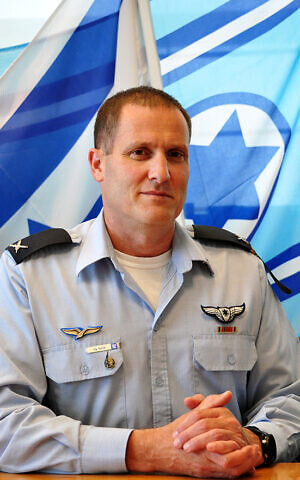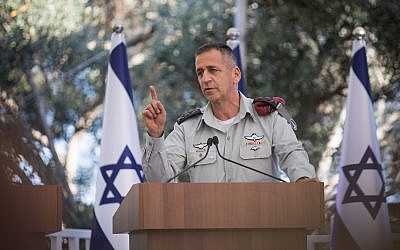

Another air force officer also slated to command newly formed Force Design Directorate, as military announces fresh appointments
By JUDAH ARI GROSS 25 February 2020, 10:55 pm
IDF Chief of Staff Aviv Kohavi on Tuesday nominated Brig. Gen. Tal Kalman to lead the nascent Strategy and Iran Directorate, a new position on the General Staff focused principally on Israel’s fight against the Islamic Republic, the military said.
The creation of this position, along with other changes to the structure of the Israel Defense Forces, was part of the military’s multi-year Momentum Plan.
Before he enters the position, Kalman, a former fighter pilot who currently leads the IDF’s Strategic Division, will be promoted to the rank of major general.
Kalman’s was one of four nominations for major general positions announced Tuesday night.


Another airman, Brig. Gen. Tomer Bar, was slated to take command of the IDF’s reformed Planning Directorate, which has been renamed the Force Design Directorate and will be tasked with overseeing the development of new combat and weapons techniques, specifically in tactics and techniques that require cooperation between the various branches of the military.
Bar was also slated to be promoted to major general before entering his position.
The head of the IDF Home Front Command, Maj. Gen. Tamir Yidai, was nominated to succeed Maj. Gen. Nadav Padan as the head of the IDF Central Command.
Brig. Gen. Uri Gordon, the chief of staff of the IDF Ground Forces, was picked as Yidai’s successor in the IDF Home Front Command. He too will be promoted to the rank of major general.
All of these appointments were approved by interim Defense Minister Naftali Bennett, the IDF said.
Kalman’s Iran directorate will focus not only on Israel’s efforts to counter Tehran, but also on the development of the military’s larger strategies and international relations.
As such, the IDF’s Liaison Unit, which maintains relations with foreign militaries, will be moved into this new directorate, along with the Planning Division. Currently, these two units are part of the IDF Planning Directorate.


In the view of IDF chief Kohavi, just as there is a major general whose primary mission is overseeing the fight against Hezbollah — head of the Northern Command Maj. Gen. Amir Baram — and one for countering Hamas — Southern Command chief Maj. Gen. Herzi Halevi — so too should there be a major general responsible for Iran.
“We want someone to wake up every morning with Iran set above his highest joy,” IDF Spokesperson Hidai Zilberman told reporters earlier this month, referencing a line from Psalm 137 referring to the importance of Jerusalem.
The directorate will be responsible for countering Iran only, not its proxies, like the Hezbollah terror group, which will remain the purview of the IDF Northern Command.
Bar’s new Force Design Directorate will work to develop new fighting techniques using aspects of all branches of the military. It is meant to complement the current system, in which each branch of the IDF is responsible for developing and implementing its own tactics — allowing for techniques that use both air power and ground forces, for instance.
“Force buildup works well within branches of the military, but not as well between branches of the military,” Zilberman said.


Kohavi’s Momentum Plan deals extensively with this issue, envisioning a far more integrated military.
“There are lots of new changes, someone needs to be responsible for this,” Zilberman said.
Bar will also be able to work with the Defense Ministry and defense contractors to develop and acquire new weaponry and equipment.
Earlier this month, Kohavi presented the main aspects of his Momentum Plan to the military’s top officers. It is meant to serve as a overarching guide for the IDF’s planning and development over the next five years, succeeding the five-year Gideon Plan created by Kohavi’s predecessor, Lt. Gen. Gadi Eisenkot.
The plan calls for large-scale acquisitions of new missiles, drones, armored vehicles, air defense batteries, helicopters and ships alongside the upgrading of existing equipment. It will not come cheap, requiring a significant budget increase — made yet more difficult by the lack of a fully functioning government.
The guiding principle of the Momentum Plan, known in Hebrew as Tenufa, is to take full advantage of the areas in which the IDF has superiority over its enemies — air power, intelligence and technology — in order to ensure the Israeli military maintains a constant and significant edge over its foes, notably Iran and Hezbollah.
The military plans to use this superiority to win any future war as quickly as possible, with the understanding that the longer a conflict drags on, the more the result will look like a loss regardless of who is victorious on the battlefield.
To do so, the IDF believes it must significantly improve its ability to identify enemy targets and strike as many as quickly as possible. The plan will therefore also involve improving the quality and quantity of equipment and weaponry and making those capabilities available to a larger number of troops through better communication and accessibility.
“Carrying out the multiyear Momentum Plan will allow the IDF to significantly increase its capabilities. The plan will increase the lethality of the IDF… [it] will create conditions to shorten the duration of a war,” Kohavi told top officers this month.
Source: Times of Israel





